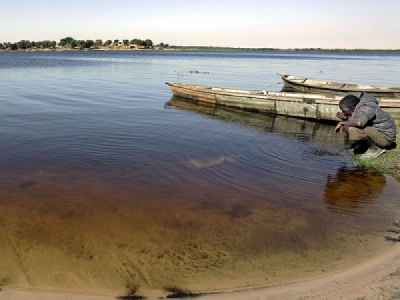
Posted on April 3, 2018
By Bassey Effiong Bassey, The Guardian
BASSEY EFFIONG BASSEY, an engineer, is advocating for research centre to study the dilemma facing Lake Chad as well as an integrated studies of rivers flowing into the Benue River.
An article in The Guardian of Monday, February 26, 2018 seemed intended to inform the general public of the plight of fellow Nigerians and other citizens of the riparian state of Lake Chad.
I have been in the profession of Water Resources Engineering for six decades and at a time served as a member of the Nigeria’s delegation to the Chad Basin Commission when I was a staff of the Inland Waterways Department of the Federal Ministry of Transport. I was a young man at the time but now I am 88 and certainly my memory is fading, but not so much the principles.
It is clear to me that the authors were not quite at home with the topic they were engaged on. The units of measurement were misapplied. Amongst those of us who had been active in the field of Water Resources Engineering, some might suspect that the wish of the writers is to prepare the minds of the public, government and National Assembly to be favourably disposed when the project estimates are prepared.
The Minister of Water Resources, Suleiman Adamu, was quoted to have said, “What we have on the table now is the inter-basin transfer from the Congo Basin into the river…..we are talking of drawing from different basins with a distance of over 2,500 kilometres. It is huge infrastructure project..”
In my humble opinion, it would be humiliating if Nigeria should, after nearly 60 years of independence, approach the world community with a proposal for a dicey project of this nature because the international community may take advantage of our professed helplessness to present a disguised lion in a sheepskin. How many times would the bee sting us before we know how to approach a beehive?
Some years back, Nigeria was enticed to construct the Kainji Dam with locks based on foreign advice that will provide Niger Republic with cheaper access to the sea, but while the construction work was in progress, Mali changed the regime of the river at Timbuktu for her development, thus affecting the expected flow through Niger Republic to Nigeria. Consequently, the projected major return of the investment became a pipe dream and a loss to Nigeria.
The difference in reservoir capacity is substantial. The reliance on foreign advisers had always been disadvantageous to Nigeria.A foreign consultant sold the idea of dredging of River Niger to encourage the development of inland ports at Baro and Onitsha. But working under S.J. Bocks, an engineer, a man with photographic memory, all he did was to flip over the reports of foreign consultants in their presence before taking them to task, most of them leaving in humiliation.
Under him, I undertook a study of the use of self-cleansing dredging methods after coming to the conclusion that mechanical dredging would be uneconomical especially as the National Assembly and the Federal Government had succumbed to road lobby mounted by Hausa/Fulani and Ibo transporters to cause the collapse of river transportation and railways. Nigerians had to live with the situation until the administration of President Goodluck Jonathan when the dredging of River Niger was set in motion. At the end of the project, the then Managing Director of Federal Inland Waterways Authority gleefully announced that he had successfully completed what was thought to be an impossible task. On that occasion, the undersigned responded to let him know he was wrong. Indeed, the current administration has come to pooh-pooh that the entire exercise was a waste of money. And so will every attempt at mechanical dredging of the Niger continue to be.
On the Lake Chad dilemma, a research centre should be established at the University of Maiduguri with the Chad Basin catchment area, funded by the Federal Government, under the Nigerian know-how. There is abundance of Nigerian experts with world recognition who could make Nigeria proud. The Research Centre will take salinity measurements, sand distribution in the vertical, and bed survey at regular intervals, analysis of crude oil exploration records to determine whether the loss in water level and changes in salinity are the result of evaporation or subsurface drainage or otherwise?
The engagement of satellite imagery to obtain valuable information on a continuous basis should be useful. All information gathered would be collated and analysed at the research centre to come out with the most appropriate and informed decision on this dilemma.
Any attempt to insist on this proposal is a sure step to further economically destabilise Nigeria and push it into the list of failed states.
The resourcefulness of some Nigerians in the corridors of power is enormous. They are already thinking about the possibility of improving the navigability of the Benue River, which is well known for its high sand content and siltation rate. They wish to have that dredged. If the dredging of River Niger, a less problematic river at great cost has not provided reasonable return on investment, it is unlikely that the Benue River will yield better result.To be doubly sure, integrated studies of rivers flowing into the Benue River should be undertaken to determine the contributions of inflowing rivers in terms of sediment transport and water regime over a period of time to determine the influence of each in the River Benue situation.
The sand in the Benue River must be coming from somewhere and it should be the aim of a coordinated study to identify the contributors and the magnitude of their contributions before any meaningful attempt at dredging or water feeding could be attempted. In some countries, the Society of Engineers and others are actively involved in such exercises. Likewise in Nigeria, the Nigerian Society of Engineers can be commissioned for such studies. The projects are within Nigeria’s technical reach to undertake.
Source: The Guardian





